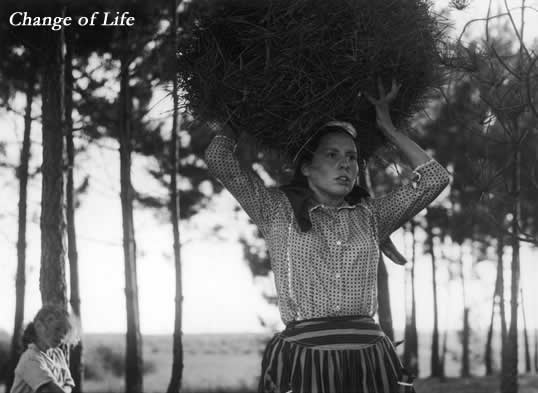 Los Angeles Filmforum presents two films classics of the Portuguese Novo Cinema, Change of Life (Mudar de Vida) and Glória.
Los Angeles Filmforum presents two films classics of the Portuguese Novo Cinema, Change of Life (Mudar de Vida) and Glória.
Sunday July 15,7:30 pm
Change of Life (Mudar de Vida), directed by Paulo Rocha. (1966, Portugal, 35mm, b&w, 90 min)
With Geraldo del Rey, Isabel Ruth, Maria Barroso
Spielberg Theatre, The Egyptian Theater, 6712 Hollywood Boulevard, Hollywood, CA.
The second and arguably most important film by Paulo Rocha (b. 1935), one of the central figures of the Novo Cinema, “Change of Life” is a direct response to Oliveira’s “Rite of Spring” (and, indirectly, to Varda’s “Pointe Courte”) and an important precursor to the radical documentary-shaped fiction of Trás-os-Montes and, much later, the work of Pedro Costa and Miguel Gomes.
Captivated by the remote Portuguese fishing village of Furadouro, Rocha chose not to make a traditional documentary but rather to engage the specificities of the people and place through fiction, crafting a melancholy story about a soldier’s return to a changing world. Inspired by his experience working with Oliveira on “Rite of Spring” and “The Hunt”, Rocha “cast” the local villagers as themselves, interspersed with experienced actors led by the great Isabel Ruth who would go onto become a Oliveira regular and an iconic presence in Costa’s Ossos. The poetry of the local vernacular is captured in the textured dialogue written by Reis, who met Rocha through Oliveira. Regardless of the steadily building critical acclaim which followed the release of “Change of Life” – and despite its controversial depiction of a disillusioned Angola War veteran – Rocha effectively ceased filmmaking until the 1980s.
Sunday July 21 7;30
Spielberg Theatre, Egyptian
“Glória” (1999, 35mm, color, 110 min). Directed by Manuela Viegas. With Jean Christophe Bouvet, Francisco Relvas, Raquel Marques.
The first and only feature film to date by influential editor Manuela Viegas (Costa’s “O Sangue”, João Cesar Monteiro’s “Silvestre”) is a stylish coming of age tale and a moving portrait of the slow death of a rural Portuguese town. Co-written by Viegas and Joaquim Sapinho, “Glória” is a nuanced exploration of first love’s dangerous exhilaration, awakened in the eponymous thirteen-year-old by the release from prison and homecoming of the stationmaster’s older and enigmatic son. A central figure of the Portuguese film scene of the 1980s and 1990s, Viegas taught alongside Reis in the Escola Superior.
Part of The Films and Legacy of António Reis and Margarida Cordeiro presented in association with the UCLA Film & Television Archive. The first three programs in this series were presented by the UCLA Film & Television Archive on July 6, 7, and 9. LA Filmforum members received two for one admission at the Billy Wilder Theater box office!
António Reis is revered in his native Portugal as a visionary artist whose films and many years as a beloved teacher and mentor exerted an immeasurable influence over the post-Salazar rebirth of Portuguese cinema and the new generation of filmmakers that emerged in the 1980s and 1990s. Born in Oporto, Reis found renown first as a poet before meeting the great Manoel de Oliveira who invited Reis to be assistant director on Oliveira’s first radical masterpiece, Rite of Spring (1963) working alongside another important collaborator, Paulo Rocha. The pioneering mode of poetic ethnographic cinema which Oliveira and Reis defined guided the four extraordinary works Reis co-directed with his wife, the psychologist Margarida Cordeiro, culminating in Trás-os-Montes, a lyrical search for the very “soul” of Portuguese culture and history in the myths and peasant folklore embodied in Portugal’s remote far-north region. Admired by the likes of Joris Ivens, Jean Rouch and Jean-Marie Straub, the films of Reis and Cordeiro invented a poetically liberated and hypnotically cinematographic film language, a style and sensibility that set the course of Portugal’s lasting tradition of radical cinema.
Special thanks: Haden Guest, director, David Pendleton—Harvard Film Archive; Pedro Fernandes Duarte—Rosa Filmes; Alexandra Pinho—Instituto Camões; Paulo Cunha Alves—Consul General of Portugal in Boston; José Manuel de Costa, Luis Miguel Oliveira—Cinemateca Portuguesa; João Pedro Rodrigues; Pedro Costa; Ana Conboy, Sofia Soares—Boston College; Paul Malcolm & Shannon Kellet – UCLA Film & Television Archive; Kelsey Brain; Sílvia das Fadas
Filmforum’s screening series is supported, in part, by the Los Angeles County Board of Supervisors through the Los Angeles County Arts Commission; the Department of Cultural Affairs, City of Los Angeles; the Andy Warhol Foundation for the Visual Arts; and the Metabolic Studio. Additional support generously provided by American Cinematheque. We also depend on our members, ticket buyers, and individual donors.

